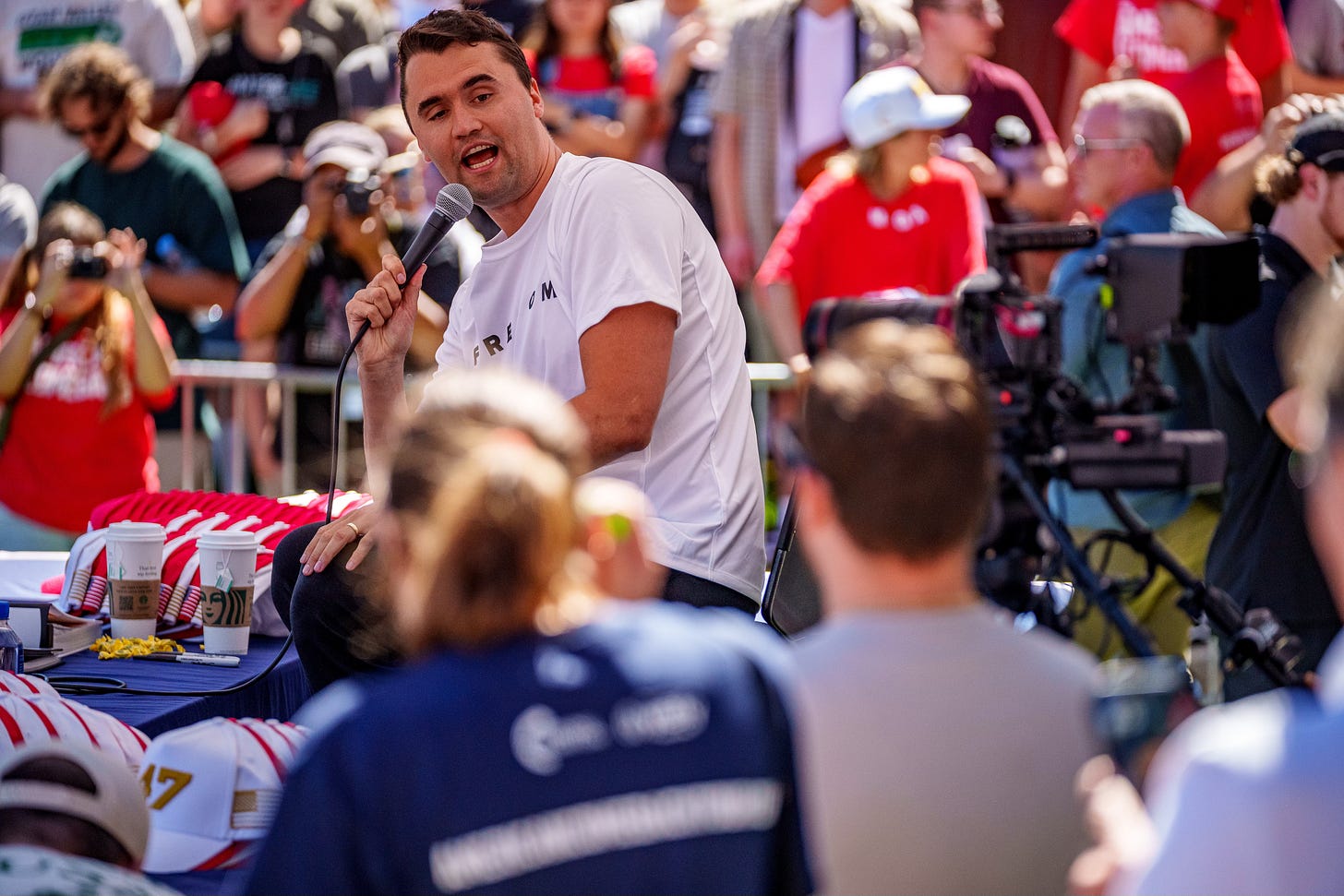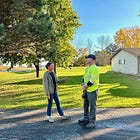We have to say “Enough!” and have the courage to mean it
"Every time either side chooses to treat fellow Americans as enemies to be destroyed, it feeds the same permission structures that make violence feel inevitable."
The Recombobulation Area is a 19-time Milwaukee Press Club award-winning opinion column and online publication founded by longtime Milwaukee journalist Dan Shafer. The Recombobulation Area is now part of Civic Media.

Scroll long enough after tragedy strikes and you’ll see it: the laughing emojis, gloating, insults flung at the dead. We see this predictable behavior each time we face unnecessary and unspeakable tragedy in this country — including the assassination of prominent conservative figure Charlie Kirk, the co-founder of Turning Point USA, at Utah Valley University, or the most recent school shootings at Evergreen High School in Colorado, which were occurring almost simultaneously this Wednesday, Sept. 10.
Less than 48 hours in, while we have seen examples of condolences or grief, too much of the discourse following Mr. Kirk’s death has amounted to points scored in an endless online game. We have reached a place where cruelty isn’t hidden anymore; it’s tallied in likes and reposts. And every time we watch this unfold, we see the consequences of a climate where rhetoric dehumanizes, divides, and normalizes harm.
This isn’t about one headline or one tragic event — it’s not about one more school shooting or the death of one man. It’s about the culture we’ve allowed to take root in America — one where words are sharpened into weapons, where faith is twisted into a political tool, and where our differences are framed not as disagreements to be argued, but as threats to be destroyed.
Listen closely to the language saturating our public life. Opponents aren’t just wrong — they’re “evil.” Neighbors aren’t simply different — they’re “radicals,” “aliens,” “thugs.” Leaders don’t lose elections; they’re victims of “godless conspiracies.” That language doesn’t just stay in speeches or on cable news. It seeps into school board meetings where parents shout across folding tables, into family dinners where arguments replace grace, even onto playgrounds where children learn to call each other names they don’t yet understand. Words meant to describe ideas start to stain people themselves. And when enough people are told, again and again, that their fellow citizens are enemies of God or enemies of the state, someone eventually decides to act as if that’s true.
That’s why we see tragedies like school shootings and political assassinations treated with selective outrage. When the victim is a conservative leader, it becomes a rallying cry. When the victims are children in a classroom, the noise fades into background chatter until the next shooting forces itself into the headlines. When the attacker can be tied to the “radical left,” it’s framed as proof of moral decay. If not, it’s written off as another “unexplainable tragedy.” Let’s be clear: we should be outraged about all of it. And that outrage should push us toward action — toward doing something, anything, to keep it from happening again.
And while violence is the most visible symptom, there are quieter consequences that permeate, too. Being on the receiving end of this rhetoric — hearing yourself or your community cast as invaders, traitors, or less than human — takes a toll. For people who are already vulnerable, it breeds fear and desperation. It erodes the sense that this country has room for them at all. And when you strip people of hope, when you tell them every day that they do not belong, the ground beneath all of us becomes more unstable.
That’s something I know from experience. When I was out knocking doors, I was called a socialist, a communist, even a traitor. I’ve been lumped in with this “radical left” more times than I can count. And the truth is, when I hear those words, I can’t help but take them personally. My life doesn’t look like that caricature. I’m a mom trying to raise good kids, a neighbor who wants to see her community thrive, someone who cares deeply about public schools and safe streets. But it’s not lost on me that the same thing happens in reverse. When people on my side use words like “deplorables,” “far-right,” or “extremists,” we may think we’re talking about politicians in power who are enacting damaging laws — but ordinary folks hear those words, too. They hear them and assume we mean them. When we say “radical left,” of course Betty sitting on her porch down the street who just wants to fund her public schools thinks you’re talking about her. When we say “far-right extremists,” of course John on his tractor, just trying to make it through another season, thinks that label is aimed at him. That’s what happens when our identities get so tangled up in politics — we stop separating policy from people. And in that confusion, good neighbors start to see each other as enemies.
And that’s where leadership matters most — because words from the top echo through every neighborhood. From the Oval Office Wednesday evening, President Trump called this a “dark moment for America,” blaming rhetoric from what he called the “radical left” as “directly responsible” for political violence. He promised to hunt down those who “contributed to this atrocity.” Instead of lowering the temperature, he raised it further. He pointed fingers, deepened divides, and cast blame squarely on one side of the aisle.
But here’s the thing: the hypocrisy could not be clearer. When Democratic lawmakers in Minnesota were violently murdered and attacked just months ago, there was no Oval Office address, no prime-time declaration that rhetoric matters. No vow to bring every contributor to justice. The silence then, compared to the outrage now, reveals the selective way violence is used in politics — condemn it when it suits your narrative, minimize or ignore it when it doesn’t.
That is why playing up a shooter’s identity or political affiliation only when it’s convenient is so abhorrent. Violence is violence. Political intimidation is political intimidation. The victims’ pain does not change depending on whether the attacker leaned left or right. Leaders who divide instead of heal make us all less safe, turning violence into political currency.
Imagine if the president had chosen differently. Imagine if he had said back in June and this week: This is a time to grieve, to pull together, and to reject violence in all its forms — no matter where it comes from, no matter who it targets. That is what leadership looks like when the temperature is rising: a steadying hand, not a fanning of flames. Words from the highest office in the land can either guide us back from the brink or shove us closer to it. And right now in America, we cannot afford leaders who mistake escalation for strength.
This moment demands clarity. We cannot shrug off violent rhetoric as “just politics.” We cannot stay silent while our neighbors are denied their humanity. And while it’s true that most of the loudest, dangerous rhetoric comes from the right, I'd be remiss if we didn't acknowledge that the left can fall into it, too. Dehumanization, no matter who uses it, corrodes our democracy. Every time either side chooses to treat fellow Americans as enemies to be destroyed, it feeds the same permission structures that make violence feel inevitable.
This is not about one man’s death or one movement’s rally. It is about the America we are building every day — in our schools, in our laws, in our churches, in our conversations.
It will take courage to confront this. Not the kind of courage that lashes out in anger, but the kind that refuses to dehumanize even when others do. Compassion is not weakness. Pluralism is not surrender. This kind of courage is strength — the strength our nation is desperate for. We must have the strength to say “enough” and to mean it.
Because the stakes are not abstract. They are the classrooms our children will sit in, the town squares where they will gather, the politics they will inherit. Whether they inherit a country where violence decides debates or one where differences can be resolved without fear or bloodshed depends on what we choose now. It’s time to demonstrate that courage.
Read more from Emily Tseffos at The Recombobulation Area:
Subscribe to The Recombobulation newsletter here and follow us on Facebook and Instagram at @ therecombobulationarea.
Already subscribe? Get a gift subscription for a friend.
Part of a group who might want to subscribe together? Get a group subscription for 30% off!
Follow Dan Shafer on Twitter at @DanRShafer and at BlueSky at @danshafer.bsky.social.






While it's true I've seen some gloating in the wake of Charlie Kirk's death (I mean, a guy who said gun deaths are OK because, y'know, the Second Amendment is more important...one can understand why some people might think chickens-->home-->roost), the first few paragraphs here are yet another example of annoying bothsidesism.
This becomes clear a couple of paragraphs in: Tseffos writes "Listen closely to the language saturating our public life. Opponents aren’t just wrong — they’re 'evil.' Neighbors aren’t simply different — they’re 'radicals,' 'aliens,' 'thugs.' Leaders don’t lose elections; they’re victims of 'godless conspiracies.'"
I'll acknowledge that I've heard opponents describe right-wing politicians as "evil." But the rest of the rhetoric quoted here? Those terms are only ever heard from right-wingers describing non- right-wingers.
The Left, and the Democratic Party, very rarely indulge in baseless name-calling. When they do name-call, it's based most often on facts...as in calling Trump a fascist because he is, in fact, doing fascist things like fascists do.
The Right has made name-calling pretty much a major part of their brand.
Just look at the Right's reaction to the killing of Charlie Kirk. Before anyone knew anything about the identity of the killer, the Right was positively foaming at the mouth in its vicious attacks on "the lunatic left" and its alleged propensity for violence, even trying to start a pathetic and utterly baseless claim that trans people are a new violent movement. (They aren't.)
Of course, it turns out that Tyler Robinson is...another right-wing son of a conservative family enamored of guns. Surprise, surprise, surprise.
Obviously not everyone left of center always behaves 100% in an admirable or fair manner. But the asymmetry is grossly weighted to the Right. As is the violence.
And pretending that "we" are all equally to blame for the violent rhetoric and consequent violence is false and unfair.
When the Republican President of the United States treasonously all but declares "WAR" (in all caps) on an American city in a public message, it's absurd to imagine that this is widespread social problem...rather than a problem that now characterizes the Right in the US.
Abel kills Cain—Thoughts the day after Charley Kirk is assassinated.
We in Milwaukee experience death and violence on nearly a daily basis. And so do ‘we’ reverberates across the nation.
The causes are many, the solutions few or seemingly ineffective. Our leaders, Milwaukee’s Mayor Cavalier Johnson has said, “enough is enough.” He seeks the path described in this article. Yes, it’s the leaders and finding ways to hold them accountable is crucial. Yet, it is all of us practicing a ‘love of neighbor’ in every particular of our daily lives. “What can I(one person do?” That!
Stories of the human condition are legion. They also invite endless interpretations. Different people have different experiences. The ‘truth’ of any story lies in the understanding and application it is given through unique experiences.
I write this reflection the day after the assassination of Charley Kirk. Personal and shared sorrow for him through individual and community practice is immediately important.
Yet, there is more. There is tomorrow. Is there something revealed in the Cain and Abel story that gives me pause to consider who I am as a citizen of the United States of America. I want to try to share how it’s making its impact on me.
The story of Cain’s hatred of his brother Abel invites us to see my own complicity in acts of hate, even those where I’ve not been present nor will be charged with a crime. Are there ways for me to find ways to grasp the reality including the horrifying act that took Mr. Kirk’s ‘one and only life.’ Is there any way at all that I or we can be moved by the possibility of forgiveness?
Is ‘Forgiveness’ possible without meaningful accountability? Abel was basically given the death sentence then a reprieve. This is extremely hard for me to understand or to practice. It does, however keep me in the reality of the situation with my own connection and responsibility. My quick reaction to not demonize the killer goes nowhere. That is different from using ‘victim’ language to reduce responsibility. It may offer the an opportunity to be more deeply ‘human’ ourselves.
I interpret the story of two brothers “Cain and Abel” as an opportunity to step away from using it to take out our anger on others. The story speaks to me especially about tendencies in my own life to be ‘hateful.’ As well as to call out the deep presence of hate in our common life. It calls me to consider how I can de-humanize others and excuse it by blaming them for in someway disrupting my life. As the story points out, violence and hatred has existed from the very genesis of human life. There is something true and defining of the essence of the response of human beings to others that is captured in this story. Yet, it also offers the reader a way to take notice and do something about it.
Starting now. At tonight’s dinner table or conversation at the local bar or during and after book club, church bingo, Packer’s Football game or patiently waiting in rush hour traffic or for the cardiologist to return my semi-urgent call.—-rick deines
Gen.4 Verses 1 to 16 Oxford Revised Standard Version of The ‘Bible’*
[1] Now Adam knew Eve his wife, and she conceived and bore Cain, saying, "I have gotten a man with the help of the LORD."
[2] And again, she bore his brother Abel. Now Abel was a keeper of sheep, and Cain a tiller of the ground.
[3] In the course of time Cain brought to the LORD an offering of the fruit of the ground,
[4] and Abel brought of the firstlings of his flock and of their fat portions. And the LORD had regard for Abel and his offering,
[5] but for Cain and his offering he had no regard. So Cain was very angry, and his countenance fell.
"Why are you angry, and why has your countenance fallen?
[7] If you do well, will you not be accepted? And if you do not do well, sin is couching at the door; its desire is for you, but you must master it.”
[8] Cain said to Abel his brother, "Let us go out to the field." And when they were in the field, Cain rose up against his brother Abel, and killed him.
[9] Then the LORD said to Cain, "Where is Abel your brother?" He said, "I do not know; am I my brother's keeper?”
[10] And the LORD said, "What have you done? The voice of your brother's blood is crying to me from the ground.
[11] And now you are cursed from the ground, which has opened its mouth to receive your brother's blood from your hand.
[12] When you till the ground, it shall no longer yield to you its strength; you shall be a fugitive and a wanderer on the earth."
[13] Cain said to the LORD, "My punishment is greater than I can bear.
[14] Behold, thou hast driven me this day away from the ground; and from thy face I shall be hidden; and I shall be a fugitive and a wanderer on the earth, and whoever finds me will slay me.”
[15] Then the LORD said to him, "Not so! If any one slays Cain, vengeance shall be taken on him sevenfold." And the LORD put a mark on Cain, lest any who came upon him should kill him.
[16] Then Cain went away from the presence of the LORD, and dwelt in the land of Nod, east of Eden.
*The ‘Bible’ is not the sacred text of all readers. That does not diminish the depth Truth of its stories. That decision belongs to the readers. For some the word ‘Lord’ may be a stumbling block indicating a specific ‘god’ belonging to another religion. It is, however, a recognition of a power present in life, a sacred dimension that is simply a real Presence in human experience.